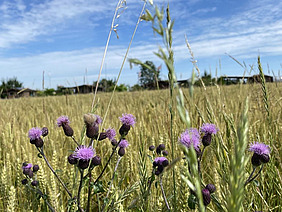In the past, political targets have been set worldwide to increase the proportion of organic agriculture. However, these targets have not yet been met, and adoption rates vary greatly between countries and crops. One key question is, therefore, what measures could be taken by stakeholders in the food value chain and by policymakers. Scientific findings can provide a valuable basis. There are numerous case studies, but a systematic overview of these results has been lacking until now.
Summarising recommendations
The study "Farmers’ adoption of organic agriculture – a systematic global literature review" by Niklas Möhring (University of Bonn), Adrian Müller (FiBL) and Sergei Schaub (Agroscope) has filled this gap. They analysed 120 international research papers and collected 182 recommendations, which were categorised into five groups:
- Knowledge-building: In regions where the share of land under organic agriculture is low, informational and educational measures should be prioritised.
- Subsidies and incentive systems: Targeted subsidies and the elimination of economic barriers can play an important role in encouraging further growth in markets where organic agriculture is already established, since a general awareness already prevails, and both infrastructure and informational systems are often already at an advanced stage.
- Strengthening cooperation: In systems that are more productive, providing support for agricultural cooperation and networks is important.
- Market development: Particularly in less productive regions, the creation of infrastructure and supply chains is crucial.
- Adaptation of measures: Policy tools should be adapted to local socioeconomic and ecological circumstances as well as to changes in the organic market over time.
Local adaptation is crucial
Measures should be adapted to local environmental conditions, agricultural practices and the current state of development with regard to organic farming: While in less developed regions, the focus is on education, in established markets, political incentives such as subsidies are useful. Combined approaches, such as advisory services together with financial support, are particularly effective.
There are still gaps in research in important exporting countries and in regions such as Africa or South America, where organic farming is not very widespread. Also, changes over time and the role of demand have hardly been studied to date.
More than just political intervention
With the study, the researchers want to provide an overview of science-based recommendations for promoting organic farming. Measures must be based on local conditions and the state of development. While so far, the main approach has been to use policy to exert influence, advisory services, information and market conditions can provide important additional incentives.
The key findings of the study have been summarised for a broader audience in a policy brief in Swiss Agricultural Research (in German, English and French) and in a blog post (in German) (see links below).
Authors: Corinne Obrist and Theresa Rebholz, FiBL
Further information
Contact
Links
- orgprints.org: Study "Farmers’ adoption of organic agriculture – a systematic global literature review"
- agrarforschungschweiz.ch: Policy brief
- agrarpolitik-blog.com: Blog post (in German)




